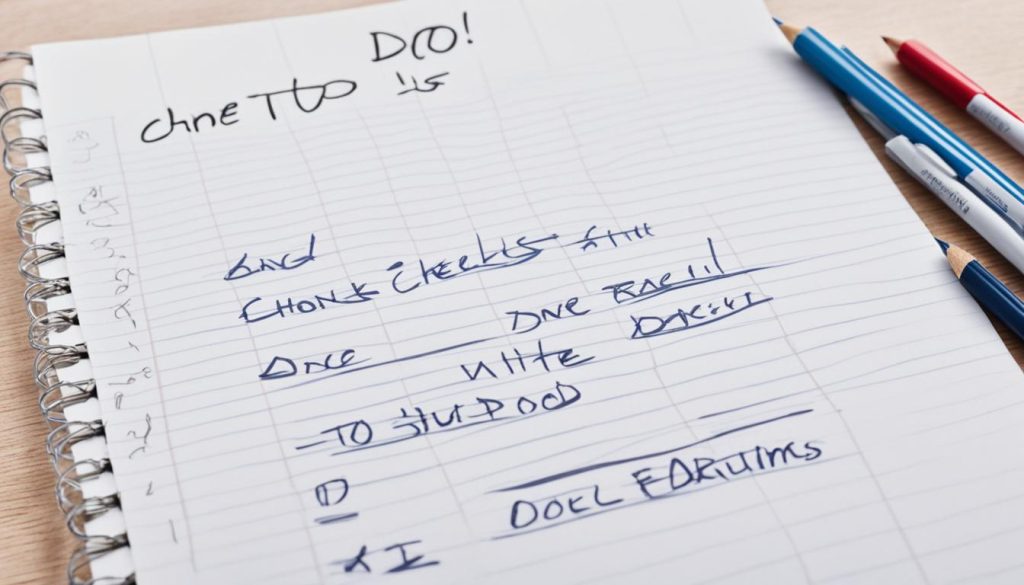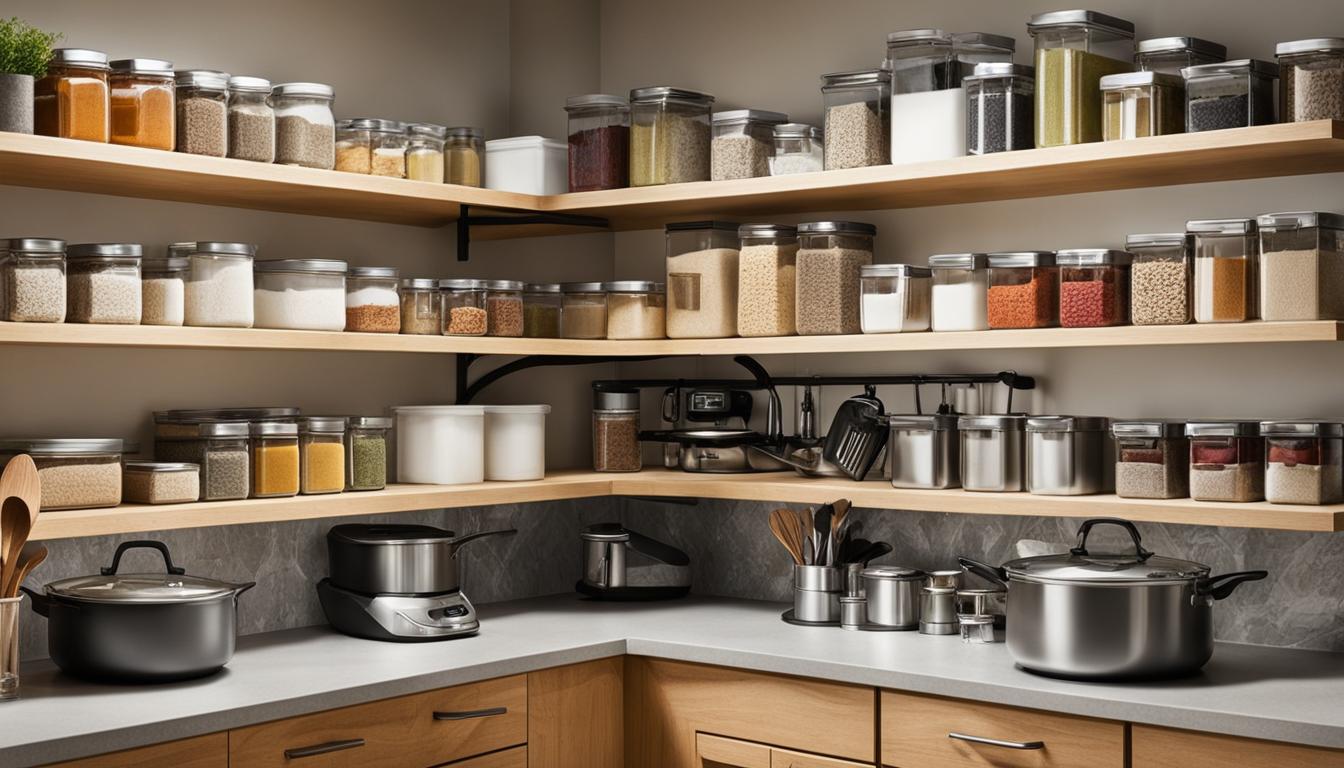Decluttering your home and organizing your life can have a profound impact on your overall well-being. It can help reduce stress, increase productivity, and create a serene living environment. In this comprehensive home organization guide, you will find expert tips and strategies to declutter your space, maximize storage, and promote tidiness for a more organized and peaceful life.
Key Takeaways:
- Decluttering your home and organizing your life can reduce stress and increase productivity.
- Maximizing storage space helps create a more organized and peaceful living environment.
- Promoting tidiness in your home leads to a more serene atmosphere.
- Implementing expert tips and strategies can help you achieve an organized and clutter-free life.
- Stay tuned for valuable insights and practical advice in the following sections of this comprehensive home organization guide.
The Importance of Decluttering Your Home
Clutter can have a negative impact on both your physical and mental well-being. It creates a chaotic and overwhelming environment that can lead to stress, decreased productivity, and even strained relationships. To regain control and create a more peaceful living space, it’s essential to declutter and embrace minimalism.
Decluttering your home allows you to eliminate unnecessary possessions and create a more organized and functional space. By removing clutter, you reduce visual distractions and create a calming atmosphere that promotes relaxation and focus. With a decluttered home, you can experience a sense of clarity and tranquility, ultimately reducing stress levels.
“Minimalism is not about having less. It’s about making room for more of what matters.”
– Joshua Becker
Embracing minimalism goes beyond just getting rid of physical clutter. It’s a mindset that focuses on intentionally choosing what adds value to your life and discarding the rest. By letting go of unnecessary items, you can prioritize what truly matters, such as meaningful relationships, personal growth, and pursuing your passions.
Moreover, decluttering your home has a direct impact on your productivity. A clutter-free environment allows you to think clearly and make decisions more effectively. It reduces distractions and increases your ability to focus on the tasks at hand. By eliminating the physical and mental clutter, you create a space that supports your goals and enhances your efficiency.
The Benefits of Decluttering:
- Reduced stress levels
- Increased productivity and focus
- Enhanced creativity and clarity of mind
- Improved physical and mental well-being
- Promotion of a peaceful and organized living space
Take the first step towards a more minimalist and clutter-free life by decluttering your home. Start small, one area at a time, and let go of items that no longer serve a purpose or bring you joy. Gradually, you’ll create a space that nurtures your well-being and allows you to thrive.

Creating a Checklist for Organizing Your Life
To effectively organize your life, creating a checklist is an essential step. A checklist provides a clear roadmap for tackling tasks, ensuring that nothing falls through the cracks. By following this systematic approach, you can prioritize your activities, set deadlines, and track your progress along the way.
Start by listing all the tasks you need to complete, both in your personal and professional life. This comprehensive inventory will give you a holistic view of your responsibilities and help you identify any areas that need immediate attention.
Task Prioritization
Once you have your checklist, it’s crucial to prioritize your tasks. Not all tasks hold the same level of importance or urgency, so it’s essential to distinguish between them. Evaluate each item on your list and determine its significance in relation to your overarching goals and deadlines.
Use your checklist as a tool to rank tasks based on their priority. Consider the consequences of not completing a particular task on time, the impact it will have on your productivity, and its alignment with your long-term objectives. By prioritizing effectively, you can allocate your time and resources more efficiently.
Break Down Larger Tasks
Large tasks can often feel overwhelming, making it difficult to make progress. To overcome this, break down larger tasks into smaller, more manageable sub-tasks. By dividing complex projects into smaller steps, you can approach them systematically and make steady progress.
For example, if you have a task like “Plan a corporate event,” you can break it down into smaller sub-tasks such as “Choose a venue,” “Create a guest list,” or “Organize catering.” This approach not only makes the task seem less daunting but also allows you to track your progress more effectively.
Setting Deadlines
To ensure timely completion of your tasks, it’s crucial to set deadlines for each item on your checklist. Deadlines create a sense of urgency and help you allocate your time and resources efficiently. Be realistic when setting deadlines, considering the complexity and time required for each task.
As you assign deadlines, be mindful of dependencies between tasks. Some tasks may need to be completed before others can start. By considering these dependencies, you can create a logical sequence of activities and avoid unnecessary delays or bottlenecks in your workflow.
Tracking Progress
Regularly reviewing and tracking your progress is essential for staying on top of your checklist. It allows you to identify tasks that are falling behind schedule or require adjustments. Consider using a task management tool or a simple spreadsheet to keep track of your tasks, deadlines, and completion status.
| Task | Priority | Deadline | Status |
|---|---|---|---|
| Prepare quarterly report | High | March 31, 2023 | In progress |
| Pay bills | Medium | February 15, 2023 | Completed |
| Research vacation destinations | Low | March 15, 2023 | Not started |
By regularly reviewing your checklist and tracking your progress, you can make necessary adjustments, reprioritize tasks, and ensure that you stay on track towards your goals.
Creating a checklist is a powerful organizational tool that enables you to effectively manage your tasks, deadlines, and overall progress. With a clear roadmap in place, you can tackle your responsibilities with confidence, improve your productivity, and achieve a more balanced and fulfilling life.

Tools for Organizing Your Life
When it comes to organizing your life, having the right tools can make all the difference. Whether you prefer the traditional approach or embrace technology, there are a variety of options to suit your organizational style. Let’s explore some of the essential tools that can help you stay on top of your tasks, goals, and priorities.
Planners
Planners are tried and true tools for keeping your life organized. With a planner, you can schedule appointments, set reminders, and track your progress towards your goals. Whether you prefer a physical planner or a digital version, finding the right format and layout is key in ensuring you effectively manage your time and stay productive. Popular planner brands include Erin Condren, Moleskine, and Blooming Planners.
Books and Journals
Books and journals provide the perfect space to set goals, track progress, and brainstorm ideas. They offer a tangible place where you can jot down your thoughts, reflect on your achievements, and plan for the future. Whether you choose a guided journal, like The Five-Minute Journal, or an open-ended one, such as The Bullet Journal Method, the important thing is to find a format that inspires you and allows you to document your thoughts and progress effectively.
Digital Apps
If you prefer the convenience of having your organizational tools at your fingertips, digital apps can be a game-changer. Applications like Trello, Evernote, and Todoist offer a convenient way to create and organize tasks, notes, and reminders across multiple devices. With features like collaboration and syncing, these apps make it easy to stay on top of your to-do list no matter where you are. These digital tools are popular among tech-savvy individuals looking for seamless integration into their daily routines.
“Stay organized and focused on your goals with the right tools.”
– Martha Johnson, Organization Expert
Ultimately, the choice of tools depends on your personal preferences and needs. Some individuals find a combination of both physical and digital tools works best for them, while others prefer to solely rely on one method. The key is to select tools that align with your organizational style and integrate them into your daily routine.
| Tool | Benefits |
|---|---|
| Planners | – Scheduling tasks and appointments – Tracking goals and progress – Time management |
| Books and Journals | – Setting goals and priorities – Reflecting on achievements – Brainstorming and idea generation |
| Digital Apps | – Creating and organizing tasks – Syncing across devices – Collaboration and sharing |

Tips for Using a Planner to Organize Your Life
A planner can be a powerful tool for managing your time and organizing your life. By utilizing a planner effectively, you can enhance your time management skills, prioritize tasks, and maintain flexibility in your daily routine. Here are some valuable tips for utilizing a planner to stay organized:
- Choose the Right Planner: Select a planner that suits your needs and preferences. Consider factors such as size, layout, and additional features like goal tracking or habit trackers. A planner that resonates with you will make it easier to stay organized and motivated.
- Write It Down: Use your planner to jot down important appointments, deadlines, and tasks. The act of writing things down helps reinforce memory and ensures that you won’t forget any crucial commitments.
- Practice Prioritization: Prioritize your tasks by assigning them specific levels of importance and urgency. This approach allows you to focus on what truly matters and accomplish tasks in order of their significance.
- Set Realistic Goals: Use your planner to set realistic and attainable goals. Break down larger goals into smaller, manageable tasks with defined deadlines. This approach minimizes overwhelm and allows for a steady pace of progress.
- Regularly Review and Adjust: Take the time to regularly review your planner. This allows you to assess your progress, identify any tasks or goals that need adjustment, and make necessary modifications to ensure you stay on track.
- Embrace Flexibility: Recognize that life is dynamic, and plans may change. Be flexible and willing to adapt your schedule and priorities when unexpected opportunities or challenges arise. It’s important to maintain a balance between structure and adaptability.
Using a planner effectively can help you master time management, prioritize tasks, and maintain flexibility in your daily life. By following these tips, you’ll be on your way to a more organized and productive lifestyle.
Stay on Top of Your Goals with a Planner
A planner not only keeps you organized but also allows you to track your progress towards achieving your goals. Whether you’re aiming to improve your fitness, learn a new skill, or embark on a career milestone, a planner can serve as a visual reminder of your aspirations and keep you motivated along the way.
“A planner is like a compass that guides you towards success by allowing you to navigate through your daily commitments and chart your progress.” – [Famous Motivational Speaker]
Benefits of Using a Planner
| Benefit | Description |
|---|---|
| Enhanced Time Management | A planner helps you allocate your time more effectively, ensuring that you make the most of each day and accomplish important tasks on schedule. |
| Improved Productivity | By having a clear overview of your tasks and deadlines, a planner enables you to prioritize and focus on high-priority activities, leading to increased productivity. |
| Reduced Stress | With a planner, you can minimize last-minute rushing and avoid the stress associated with forgotten appointments or missed deadlines. |
| Goal Achievement | A planner serves as a roadmap for achieving your goals, allowing you to break them down into actionable steps and track your progress over time. |
| Better Work-Life Balance | By effectively managing your time and priorities with a planner, you can create a more balanced lifestyle, ensuring that both personal and professional responsibilities are met. |
Quick Start Guide to Organizing Your Life
If you’re looking for a quick way to start organizing your life, follow this one-week plan. Begin by decluttering your physical space, getting rid of anything you don’t need. Clearing out the excess can help create a more serene and organized environment.
Create a checklist of daily tasks and prioritize them based on importance and urgency. By breaking down your to-do list, you can better manage your time and stay on track throughout the day. This will help you accomplish more and feel a sense of accomplishment.
Set up a planner and schedule your tasks for the week. By writing them down, you’ll have a clear visual of what needs to be done and when. This will ensure that no task slips through the cracks and help you stay organized.
Incorporate meal planning into your routine. Create a meal plan for the week and do your grocery shopping accordingly. This will save you time and money, as well as help you make healthier food choices. Plan your meals in advance, and you’ll have one less thing to worry about each day.
Designate specific days for laundry and cleaning. By establishing a routine, you can avoid overwhelming messes and stay on top of household chores. Breaking down these tasks over multiple days will make them more manageable and less time-consuming.
Review your finances and create a budget. Take a close look at your income and expenses to gain a clear understanding of your financial situation. Create a budget that aligns with your goals and priorities. This will help you stay organized and make better financial decisions.
Finally, take a moment to relax and enjoy the benefits of your newly organized life. Embrace the sense of calm and productivity that comes with organization, and use this as motivation to maintain your newfound orderliness.
FAQ
How can decluttering and organizing my home improve my well-being?
Decluttering your home and organizing your life can reduce stress, increase productivity, and create a serene living environment, leading to improved overall well-being.
What are the negative impacts of clutter on my physical and mental health?
Clutter can cause stress, decrease productivity, and even affect your relationships.
How can I prioritize tasks and effectively organize my life?
Create a checklist, prioritize tasks based on importance and urgency, break down larger tasks into smaller ones, assign deadlines, and regularly review and adjust your checklist.
What tools are available to help me organize my life?
Planners, books and journals, and digital apps like Trello and Evernote are useful tools to keep track of tasks, set goals, and organize notes and reminders.
How can I use a planner to manage my time and organize my life?
Choose a planner that suits your needs, write down appointments, deadlines, and tasks, prioritize tasks, set realistic goals, and review and adjust your planner regularly.
What is a quick way to start organizing my life?
Start by decluttering your physical space, create a checklist of daily tasks, set up a planner, create a meal plan and grocery shop, designate specific days for laundry and cleaning, review your finances and create a budget, and take a moment to relax and enjoy the benefits of your organized life.




